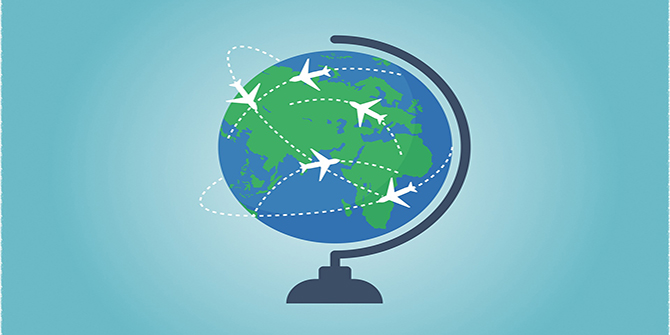 The UK would like to export more to Australia and New Zealand after Brexit. Malcolm Abbott (Swinburne University of Technology) looks at the history of trade between the three countries and the prospects for growth in the future.
The UK would like to export more to Australia and New Zealand after Brexit. Malcolm Abbott (Swinburne University of Technology) looks at the history of trade between the three countries and the prospects for growth in the future.
How might the UK increase its trade and other economic links with parts of the world outside the Union after Brexit? Among other suggestions, commentators and politicians have speculated about the prospects of negotiating Free Trade Agreements with Australia and New Zealand. Interest on the part of the three respective governments in these prospects has led to the establishment of Australia-UK and New Zealand-UK Trade Working Groups in September 2016, as well as parliamentary committees of inquiry in both Australia and the UK.

The UK has an important history of close economic relations with New Zealand and Australia, being the main trading partner of these two countries before the 1960s. There was a decline in importance in these relations from the mid-1960s on, and in the 1970s, partly because of the United Kingdom’s entry in 1973 to the European Economic Community, but also because of the cessation of New Zealand and Australian preferential treatment of British imports in the 1970s (see Figure 1). As well, there occurred – even before 1973 – a long run shift in the focus of each of these countries’ trade, the UK’s towards Europe and the other two towards the Asia-Pacific region. In spite of the fall in the importance of UK trade with New Zealand and Australia relative to Europe, there are still significant trade links between them, and the absolute fall in trade volumes that took place in the 1970s was reversed from the mid-1980s onwards up until the global financial crisis of 2008 (Figure 1).
Even without the UK leaving the EU, it would be expected that its trade with Australia and New Zealand will increase in the future, along with other countries around the non-EU world. The growth in trade between the UK and New Zealand/Australia that occurred since the mid-1980s is based on the three countries’ current comparative advantages. The agricultural resource endowments of the New Zealand and Australian economies mean that they export fairly similar products, although both countries have some export industries that are different from each other. In the New Zealand case, forestry products have been important exports, and in the Australian case mineral products. In terms of imports, both countries have predominantly imported manufactured goods; especially transport equipment, machinery, pharmaceuticals, and chemicals – all of which the UK exports. In all likelihood, therefore, after Brexit trade of this sort will grow. The different comparative advantages of the countries would tend to encourage the view that there is scope for additional trade between them.
If it does, however, it will be reliant upon a few factors. First of all, there is the amount of economic growth in the three nations. The sluggish economic performance of the UK economy since the global financial crisis has been a major impediment to growth in trade between the three countries. Second is the degree of openness of the three countries to international trade; and finally it will depend on the relative competitiveness of each countries’ goods in international markets.
It is possible, of course, that the three countries could negotiate trade barrier reducing agreements between them post-Brexit. If these involve reduced tariffs, the impact would be greatest on the flow of food products rather than other goods such as mineral and forestry products and manufactured goods, which already face few trade barriers. Further trade might also be encouraged by the influence of global value chains that might link, say British exports to markets of the Asia-Pacific region through Australia and New Zealand.
The whole story of the three countries’ economic relations is not provided for by simply looking at volumes of merchandise trade. Indeed, recently the export and import of services has been gaining in importance to the New Zealand, Australian and UK current accounts. In each case, much of these services have been in tourism, financial services, transport, education and shipping. Because of the language and cultural similarities between the three countries, the trade in services between them figures more prominently than in the relations with other countries. Australia, for instance, exports approximately ten per cent of its services to the UK and receives 17 per cent of imports in return. In addition to trade in services, investment flows from the UK to New Zealand/Australia and vice versa are very important. The future expectation is that because of the comparable nature of each country’s cultural and institutional nature, additional scope for more direct investment to take place will emerge. The UK is second in size as an origin of overseas investment in the other two countries; second to Australia in overseas investment into New Zealand, and second to the United States in overseas investment to Australia. Australia is also an important investor in the UK. The prospect would be that there would be scope for both services trade and investment flows between the countries to grow over time, with any economic agreement between the three countries paying particular attention to associated issues.
Much of the future negotiations between the three countries post-Brexit will take up a range of issues associated with food imports into the UK, as well as investment and the trade in services – and much of the extent of future prospects for growth in trade might depend on the success of these negotiations. Exporting from the UK to countries like Australia and New Zealand can in no way replace European trade, because of the sheer scale of the latter, but success will be an indicator of the UK’s ability to trade and engage with the world outside of Europe more generally.
This post represents the views of the author and not those of the Brexit blog, nor the LSE. It is based on Abbott, M. 2019, ‘The United Kingdom’s economic relations with New Zealand and Australia after Brexit’, The Round Table: the Commonwealth Journal of International Affairs.
Malcolm Abbott is an Associate Professor of Economics at Swinburne University of Technology, Melbourne.







